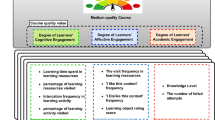Abstract
EVALUATION ACTIVITIES provide vital information on which to base planning and implementation decisions related to today’s rapidly changing educational environment. This article discusses the context of and rationale for the rigorous, well-planned evaluation of online courses and programs; differentiates among evaluation, assessment, and research; and describes the various purposes evaluation can serve. Further, it provides an overview of the literature with particular reference to representative examples of approaches and models currently in use for evaluating online programming. Finally, it discusses emerging trends in evaluation, including the development of standards of quality that can guide evaluation of online courses and programs and recent research on the process of evaluation itself.
Similar content being viewed by others
Explore related subjects
Discover the latest articles, news and stories from top researchers in related subjects.References
Achtemeier, S.D., Morris, L.V., & Finnegan, C. L. (2003).Considerations for developing evaluations of online courses., 7(1). Retrieved March 2003 from http://www.sloan-c.org/publications/jaln/v7n1/v7n1_achtemeier.asp
Bates, A.W. (2000).Managing technological change. Strategies for college and university leaders. San Francisco: Jossey-Bass.
Bers, T. (1999, fall). The impact of distance education on institutional research.New Directions for Institutional Research, 103, 61–78.
Cyrs, T.E. (2001).Evaluating distance learning programs and courses. Retrieved August 2003 from http://www.zianet.com/edacyrs/tips/evaluate_dl.htm
Duning, B.S., Van Kekerix, M.J., & Zaborowski, L.M. (1993).Reaching learners through telecommunications. San Francisco: Jossey-Bass.
Ehrmann, S.C. (1997a).The Flashlight Program: Spotting an elephant in the dark. Retrieved June 2003 from http://www.tltgroup.org/programs/elephant.html
Ehrmann, S.C. (1997b).What does research tell us about technology and higher learning? Retrieved March 2003 from http://www.learner.org/edtech/rscheval/rightquestion.html
Ehrmann, S.C. (1999). Studying teaching, learning and technology: A tool kit from the Flashlight Program.Flashlight Program. Retrieved January 2003 from http://www.tltgroup.org/resources/fstudtool.html
Herrrington, A., Herrington, J., Oliver, R., Stoney, S. & Willis, J. (2001). Quality guidelines for online courses: The development of an instrument to audit online units. In G. Kennedy, M. Keppell, C. McNaught, & T. Petrovic (Eds.), Meeting at the crossroads:Proceedings of ASCILITE 2001 (pp. 263–270). Melbourne: University of Melbourne. Retrieved April 2003 from http://elrond.scam.ecu.edu.au/oliver/2001/qowg.pdf
Indiana Higher Education Telecommunications System. (n.d.).Guiding principles for faculty in distance learning. Retrieved May 2003 from http://www.ihets.org/progserv/education/distance/guiding_principles/index.html
Institute for Higher Education Policy. (2000).Quality on the line. Benchmarks for success in internet-based distance education. Washington, DC: The Institute for Higher Education Policy. Retrieved February 2003 from http://www.ihep.com/Pubs/PDF/Quality.pdf
Joint Committee on Standards for Educational Evaluation. (1994).The program evaluation standards. How to assess evaluations of educational programs. Thousand Oaks, CA: Sage.
Lockee, B., Moore, M., & Burton, J. (2002). Measuring success: Evaluation strategies for distance education.EDUCAUSE Quarterly, 25(1). Retrieved August 8, 2003, from http://www.educause.edu/ir/library/pdf/eqm0213.pdf
Milam, J. (n.d.).Cost analysis of online courses. Retrieved May 2003 from http://www.airweb.org/links/reports/costanalysis.html
Miller, G.E. (1990). Distance education and the curriculum: Dredging a new mainstream. In M.G. Moore (Ed.),Contemporary issues in American distance education (pp. 211–220). Oxford: Pergamon.
Moore, M.G. (1999). Monitoring and evaluation.The American Journal of Distance Education, 13(2), 1–5.
New Jersey Institute of Technology. ALN WebCenter. (n.d.).Research instruments. Retrieved March 2003 from: http://www.alnresearch.org/JSP/resources_frame_1.jsp
Reeves, T. (1995).Evaluation tools. Retrieved March 2003 from http://mimel.marc.gatech.edu/MM_Tools/evaluation.html
Saba, F. (2000). Evaluating distance education programs.Distance Education Report, 4(4), 1.
Southern Regional Education Board. (2000).Principles of good practice. The foundation for quality of the Electronic Campus of the Southern Regional Education Board. Retrieved June 2003 from http://www.electroniccampus.org/student/srecinfo/publications/Principles_2000.pdf
Stufflebeam, D.L. (1999).Foundational models for 21st century program evaluation. Kalamazoo, MI: The Evaluation Center, Western Michigan University.
Thompson, M., & Irele, M. (2003). Evaluating distance education programs. In M.G. Moore & W.G. Anderson (Eds.),Handbook of distance education (pp. 567–584) Mahwah, NJ: Lawrence Erlbaum Associates.
Wang, Y., Li, Z., Turoff, M. & Hiltz, S.R. (2003).Using a social decision support system toolkit to evaluate achieved course objectives. Retrieved August 2003 from http://web.njit.edu/~zx18078/research.html.
Watkins, R. & Kaufman, R. (2003). Strategic planning for distance education (2003). In M.G. Moore & W.G. Anderson (Eds.),Handbook of distance education (pp. 507–518). Mahwah, NJ: Lawrence Erlbaum Associates.
Western Cooperative for Educational Telecommunications. (1999).Principles of good practice for electronically offered academic degree and certificate programs. Retrieved April 2003 from http://www.wcet.info/projects/balancing/principles.asp.
Author information
Authors and Affiliations
Corresponding author
Additional information
ABOUT THE AUTHOR
Melody M. Thompson has a dual appointment as Director of the American Center for the Study of Distance Education (ACSDE) in the College of Education and Director of Quality & Planning for the World Campus, an Outreach unit of the Pennsylvania State University. Her current research interests include the evaluation of distance education programming, institutional policy related to distance education, and the faculty experience in the online environment. Dr. Thompson has written a number of peer-reviewed articles, several book chapters, and one book (co-authored) about distance education. She has served as book review editor forThe American Journal of Distance Education and currently serves as editor of the Sloan-C “Faculty Satisfaction” Effective Practices Web Site and on the editorial board ofJALN (Journal of Asynchronous Learning Networks).
Rights and permissions
About this article
Cite this article
Thompson, M.M. Evaluating online courses and programs. J. Comput. High. Educ. 15, 63–84 (2004). https://doi.org/10.1007/BF02940930
Issue Date:
DOI: https://doi.org/10.1007/BF02940930




